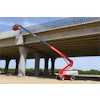When oil prices started their precipitous drop in summer of 2014, just about everyone (including myself) thought that this would be unquestionably good for the American economy: less money spent on oil, and especially imported oil, means that more is available to spend on things we really want, such as food, clothing, education, etc., and the additional spending would generate economic growth and jobs.
But now we are seeing some distressing outcomes: for the last several weeks, whenever the price of oil drops, the stock market drops, and vice versa. These outcomes are distressing (if they persist) not just because it means that investors make less money, but also because lower stock prices often foretell reductions in economic indicators that we all care about, such as personal income and jobs.
This result is accompanied by news stories showing that the consumer savings from lower oil prices has not generated new spending . Nor is there evidence that the increased consumer savings has done much good for the economy. Instead, the industrial production that used to go to drilling for oil is disappearing, with nothing to replace it.
Nobody seems to really understand what is going on. Worse, no one seems to know what to do about it, or to know if indeed there is anything we can do about it through policy.



















![Building Angled Sm Edit 6050b8d213f1b[1]](https://img.forconstructionpros.com/mindful/acbm/workspaces/default/uploads/2025/09/building-angled-sm-edit6050b8d213f1b1.Ygq5aAos3b.png?ar=16%3A9&auto=format%2Ccompress&crop=focalpoint&fit=crop&fp-x=0.53&fp-y=0.23&fp-z=2&h=135&q=70&w=240)